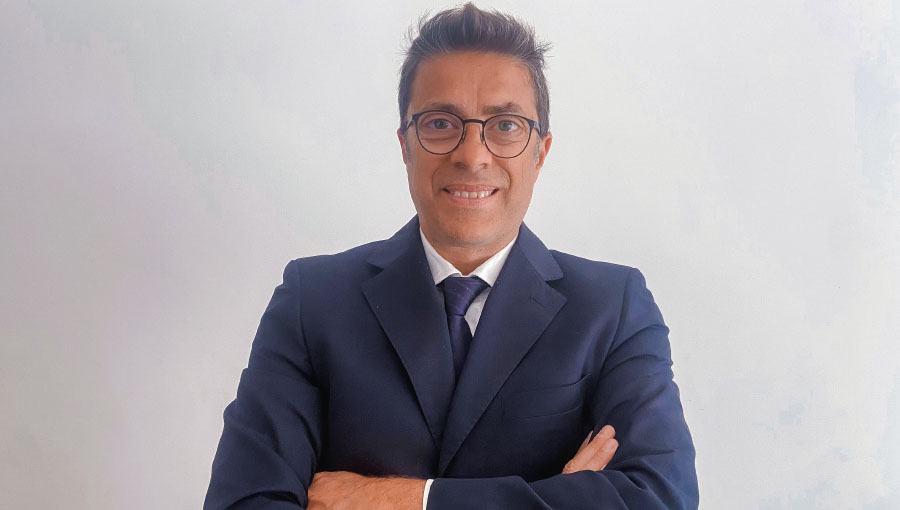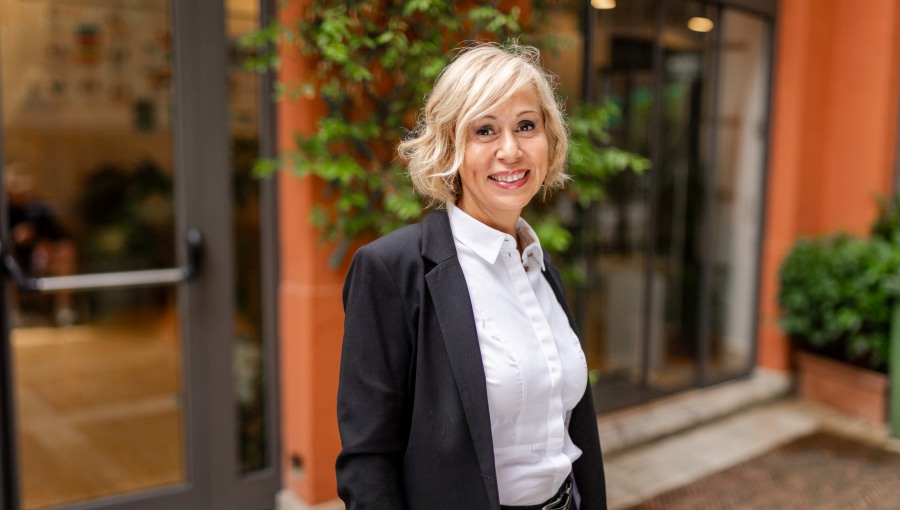Found in Translation: Italian Professor Berenice Cocciolillo
Berenice Cocciolillo was born in the Molise region in southern Italy and raised in New York City. She has been living in Rome since 1990 and teaching at JCU since 1992. She holds a Bachelor’s degree in Romance Languages and an M.A. in Italian Literature from New York University. In addition to teaching Italian and translation, Professor Cocciolillo is JCU’s Director of Web Communications. A literary translator, she is one of the founders and organizers of InVerse, JCU’s festival of Italian poetry in translation. In Fall 2021 she will be teaching Introduction to Professional Translation.

Berenice Cocciolillo
You’ve lived half your life in the United States and half in Italy. Do you feel more American or more Italian?
When I’m in the States I feel Italian and in Italy, I feel American. Let’s say that I’m a combination of a southern Italian and a New Yorker. I think John Cabot University is the perfect place for someone like me.
What brought you to JCU?
Shortly after I moved to Rome, I read an ad in the magazine Wanted in Rome that said JCU needed instructors to teach in a variety of areas. Italian was not on that list, but I decided to send in my CV anyway and the Dean called me in for an interview. You never know.
What is your teaching philosophy?
In advanced language classes, it’s common to have students of different backgrounds and skill sets. There are students who can speak but have a weak foundation in grammar, and there are those who know all the rules but have a hard time putting sentences together. In my classes, I try to foster interaction between these different types of students by creating a relaxed, welcoming atmosphere where students feel comfortable speaking, where it’s perfectly okay to make mistakes. By the end of the course, I evaluate the progress that each student has made, individually.
What type of projects are you currently working on?
I am very happy to announce that on October 13, Professors Brunella Antomarini, Rosa Filardi and I will be presenting the latest volume of InVerse Italian Poets in Translation, the bilingual anthology that we have the honor of editing. The InVerse project began in 2005 with a reading of contemporary Italian poets in JCU’s Lemon Tree Courtyard. At the root of the project was the desire to introduce English speakers to the contemporary Italian poetry scene. We try to include the works of both poets who are renowned in Italy, as well as younger and lesser-known poets whom we believe are going to leave a mark on Italian poetry. It’s not easy for poets to find publishers so we receive many submissions from authors who appreciate the opportunity that we provide. This is the eighth InVerse anthology published by John Cabot University Press.
What do you think makes someone a good translator?
A language is not simply a collection of grammar rules and vocabulary. Understanding a text goes way beyond deciphering the word on a page: there are so many facets to language and meaning that are hidden between the lines of a text: history, culture, politics. A good translator must be first and foremost a very attentive reader of the source text in order to re-interpret it and reproduce it in the best possible way in the target language. In order to do this, it’s important to have a deep knowledge and respect for the source language, its subtleties, and its possibilities. Of course, a translator also needs to be a good writer in the target language.
Probably the most difficult thing for a translator of poetry to do is to maintain fidelity to the source text while finding ways to highlight the poem’s most prominent features. The challenge is to decide what the most important features are. Is it the literal meaning, the sound, and music of the language or, could it be the historical or cultural associations? Different translators take different approaches, and it is fascinating to see how these approaches have evolved throughout the ages.
I always thought that poetry was the most difficult type of translation, but I must admit that translating comedy is also extremely challenging. I recently translated the play Il conto è servito (Our Goose is Cooked) by Italian author Sara Vannelli together with my co-translator Andrea Casson. It is full of puns and references to Italian pop culture so there were some things that needed to be completely rewritten and adapted for an English-speaking audience. It helped greatly that Andrea has the best sense of humor of anyone I know.
What are the main lessons that students take away from your Introduction to Professional Translation class?
I hope that they leave the course with a deeper understanding and appreciation for the hard work and creativity that go into translation. Just like it takes more than having two hands to be a good pianist, it takes more than knowing two languages to be a good translator. And, as learning to play an instrument requires practice, so does learning to translate, which means we do a lot of translating in a range of different subjects, including texts related to students’ majors. I try to show students that translation is fun as well as challenging because it helps you to think about both Italian and English in new ways. Not only does it help students develop practical tools that can be put to use in many different work environments, but it also helps them to improve their skills as readers, writers, and critical thinkers. I also include elements of translation theory in the course to show students that there are many ways to approach a translation.
In a world that grows increasingly digital is there still a place (and a purpose) for the study of liberal arts/humanities?
The trend of universities dropping majors like English, history, philosophy, and foreign languages pains me greatly. I know that students are under a lot of pressure to study subjects that lead to clear career pathways, but I still think that liberal arts are the essence of what a college education is about. As someone from a working-class background, I am so grateful to my liberal arts education for opening my mind and teaching me how to learn and think critically. It gave me the flexibility to adapt to a variety of roles that I have had over the years at JCU, including jobs that didn’t even exist when I graduated from college.





